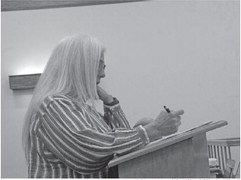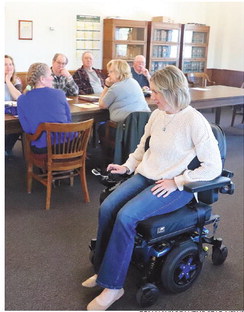City rejects tax assessment appeal from business


When it comes to challenging a property valuation at the board of review, the cards are stacked against property owners.
City property owner Bryan Schultz found this out first hand when he came before the Board of Review to challenge the assessment on his Northwoods Plaza property along Hwy 13.
According to the city, Schultz’s 3.38 acre commercial property jumped in assessed value over the past year going from a combined land and structure value of $275,100 of value to $513,400 an 86.6% overall increase in valuation.
The city underwent a complete revaluation this year. According to city assessor Cindy Chase of Elk River Appraisals and Assessments, the assessments in the city were previously at close to 80% of the fair market value on average and the revaluation brings them to 107% of the estimate fair market value. This was done to comply with state laws which require revaluations to be done periodically or when assessments are out of line with what property is selling for in the community. The last city-wide revaluation occurred more than 10 years ago.
Since property taxes are levied by municipalities based on assessed value, the assessment role is important to keep updated so that taxes can be fairly distributed in the community. As with many people in the city of Medford who saw large jumps in their home and property valuations, Schultz thought the increase was too much all at once.
“This is a staggering amount,” Schultz said asking members of the board to imagine if their home went up that amount. “I went up almost 100%, that is a lot,” he said.
The board of review is made up of the city council and the city clerk and serves as a quasi-judicial body to decide if the assessor’s amount is correct or incorrect. Under state law, the burden is on the property owner to show that the assessment is incorrect with the city required to support the assessor’s amount.
Like many property owners Schultz said he could see it going up, but thought the nearly 87% increase was too high. He presented comparables from similar commercial properties for sale in Athens, Withee and in Medford all of which were similar in size but well below his assessment. Two of the instances were turn-key established businesses and even those were below his assessment amount.
“These are other pole shed buildings approximately the same footages as mine,” he said. He said he felt the $513,000 was a little steep and instead it should be closer to $300,000 to $350,000.
Board member Greg Knight noted the comparables Schultz gave were the list prices from Realtors and not the final sale prices. “We are supposed to use sales,” Knight said, noting the board of review training required by the state.
Schultz compared real estate to used cars noting that the asking price is similar to what people receive for them. He gave the example of other nearby property in the Mertens building that is currently under contract by California Dreaming. He said the asking price for that building was $399,000.
“Just because something is for sale at that price, doesn’t mean they will get it for that,” said mayor Mike Wellner, who served as chairman of the board of review.
Following Schultz’s testimony, Chase stated the case in support of the assessment noting the comparable she used at the former Florena’s building, 647 S. 8th Street, Evergreen Plaza and the Medford Cooperative Plaza which ranged in assessment from $71 per square foot to $22 per square foot. The Northwoods Plaza is at $34 per square foot which puts it at the lower range of assessments.
“The older and larger a building is, the less value there is,” Chase explained.
Board member Tim Hansen objected to basing land value on the recent sales to Kwik Trip for the new stores in the community.
Chase said they did not factor in the amounts of the Kwik Trip land sales.
Schultz said those were unique sales. “If Joe’s Garage went up there, you wouldn’t get that for it,” Schultz said of what Kwik Trip paid for the property.
“We recognize they are outliers,” Chase said.
The Kwik Trip land on the north side sold for about $177,300 per acre, the land portion of the Schultz property is being assessed at $62,100 per acre.
Board member Clem Johnson noted that Schultz sold the property to Kwik Trip for much more than what it had been assessed at. Schultz replied that he had the property for sale for 16 years and that when a Kwik Trip or Walmart can come in with a big checkbook you need to take it. Schultz said he has had some of his lease spaces sit vacant and that it has been a tough road to get to where they are today.
“You finally get there and the rug gets pulled out from under you,” he said.
Board member Mike Bub sympathized with Schultz noting that homeowners are also seeing big increases. He noted that homes in his neighborhood are selling at $70,000 to $80,000 more than expected. “Prices are going crazy,” he said. “I don’t know anybody who is happy that was reassessed.”
Johnson noted that the assessment on his property tripled this year.
He said that he called the assessor after getting his notice and wasn’t happy. However, he noted they followed the procedure and the comparable.
Board member Laura Holmes questioned why the assessment was brought to 107% instead of just 100%.
Chase explained that they are comparing assessed value to equalized value and have to be within 10% either way. She said values can fluctuate and instead of lowering the overall to 100% they kept it higher because of the number of sales in 2021 which will impact valuation next year. “Knowing sales in 2021, we may very well be at 100% next year,” she said.
Hansen said he felt that the comparable prices presented by Schultz showed that his assessment was too high. “The prices aren’t near $513,000,” Hansen said.
“I think there is room to bring it down and adjust it,” he said.
“I think we have to be careful,” Wellner said, citing the state rules for boards of review and noting that the state wants them to use just what things are sold at. “People can ask for whatever they want,” Wellner said.
Chase noted that when it comes to commercial property everything is location. She said the places Schultz gave as comparable properties were not anywhere near his property.
In the end, the board relied on the state law that says the burden of proof is on the taxpayer to show the value is wrong and voted to keep the assessment as determined by the assessor. Hansen voted against the motion.
While assessed values in the city increased over much of the city, this does not automatically mean individual taxes will go up. With the city and county tax levy portion of the property taxes staying about the same and the school district tax levy dropping by about 25% overall tax burden should remain about the same or go down for most property taxpayers. What will change is the aggregate property tax rate which is determined by dividing the combined levy amounts by the total assessed value in the municipality. Higher overall values will generally result in a lower rate, but depending on how much individual properties increased or decreased in value the financial impact will impact people differently.






